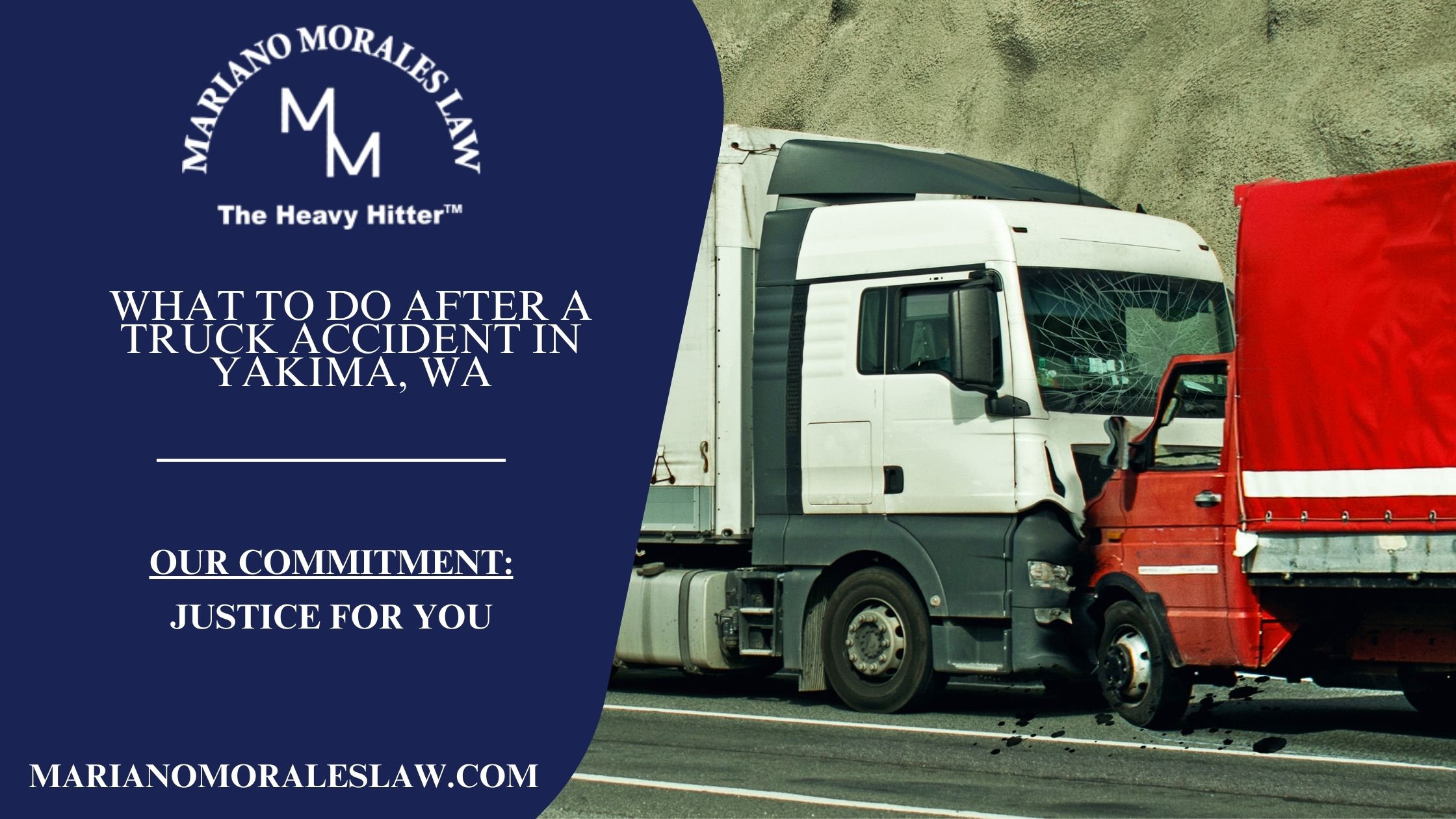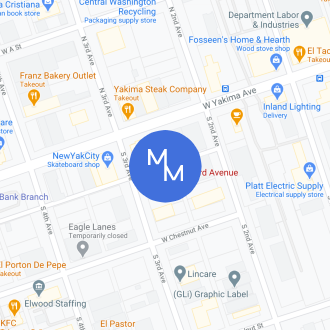What To Do After a Truck Accident in Yakima, WA

If you or a loved one has been involved in an accident with a large commercial truck, you may feel overwhelmed, scared, and unsure of what to do next. You don’t have to travel the difficult road to recovery on your own. The compassionate legal team at Mariano Morales Law has the answers you’re looking for regarding personal injury cases.
If you have been injured in a semi-truck accident and the truck driver was at fault, our law firm is here to guide you through every step of the insurance claims process and pursue fair compensation for your injuries. Commercial truck accidents are more complicated to resolve than car accidents. You should seek experienced legal assistance. Mariano Morales Law can review the details of your truck accident and explain your legal options during a free case review.
Here are a few practical steps you can take to protect your health, well-being, and legal rights after a truck accident in Yakima, Washington.
1- Ensure Safety
Your health and safety should be the top priority after any accident. Check yourself and others for injuries, but be very careful about moving anyone who might have neck or back injuries unless absolutely necessary. Request medical assistance.
If you are able to do so safely, move yourself and your vehicle out of further harm’s way to a shoulder, side street, or parking lot. Turn on your hazard lights or set out flares and safety cones if you have them to alert other drivers to slow down around the accident scene.
Truck accidents often cause serious vehicle damage, scattering dangerous debris across the roadway. If your vehicle is not drivable or the accident is blocking traffic, wait for the police to arrive so they can secure the scene and direct traffic around the hazard.
Stay calm. Avoid confronting the truck driver or other parties who may have caused the crash. Emotions can run high after an accident, but getting into an argument will only make the situation more stressful.
2- Secure the Scene
If you are not too injured to remain at the scene, you can start laying the groundwork for your case by taking the following steps.
Call the police to report the accident. Police will create an official accident report and document the scene. Be advised that if for any reason you do not summon the police to the scene, Washington state law requires you to submit your own report for any crash causing injury, death, or at least $1,000 in property damage. You have four days from the date of the collision to do so.
Ask the responding officers when and how you can obtain a copy of their accident report. While the police report may not be admissible in court, it can provide valuable information about the officer’s initial assessment of the crash, contact information for the parties involved, and other important details. A lawyer can use this report as their jumping-off point for further investigations.
Get names, contact information, license plate numbers, and insurance details for all drivers involved, especially the truck driver and trucking company. Ask the truck driver for their commercial driver’s license and registration and take pictures of these documents if possible. Jot down the truck’s license plate numbers and any identifying details about the vehicle and what it was transporting.
Try to get the names and phone numbers of any eyewitnesses who saw what happened. Their unbiased accounts can provide strong evidence to support your claim. If you see any nearby security cameras or traffic cameras that may have captured the accident, make note of those as well.
Take photos and videos of the entire accident scene from different angles before evidence is moved or cleaned up. Photograph the damage to all vehicles, your injuries, skid marks on the road, fallen cargo, missing or damaged road signs, construction zones, potholes, or anything else that helps show how the crash occurred
3- Seek Medical Attention
It is critical to get a full medical evaluation as soon after a truck accident as possible, even if your injuries seem minor or you feel uninjured. The force imparted by a truck collision can cause soft tissue damage like whiplash and strains, as well as internal injuries like organ damage and internal bleeding. Even as these injuries worsen, they may take time to manifest themselves, potentially even becoming life-threatening. Moreover, the adrenaline unleashed by a traumatic experience can dull pain you might otherwise feel, masking the symptoms of serious injuries.
Prompt medical attention will ensure that all of your accident injuries are diagnosed, treated, and documented in your medical records. This last part will be important evidence if you need to file an insurance claim or lawsuit to seek compensation for your injuries and related losses. Without proof that the truck accident directly caused your injuries and trauma, the insurance company may try to deny your claim.
Moreover, if you delay seeking treatment, the trucking company’s insurer may argue that something else caused your injuries or that they are not as severe as you claim. It’s important to go to the emergency room, urgent care clinic, or your primary care doctor as soon as you can after leaving the accident scene.
Be sure to attend all follow-up appointments and therapy sessions during your recovery process. If you skip doctor visits or stop treatment early, the insurance company may claim that you are not as injured as you say or are failing in your duty to mitigate (a legal term meaning your responsibility to make reasonable efforts to keep your injuries from worsening). This could hurt your chances of obtaining fair compensation or, if necessary, being awarded financial damages in court.
4- Contact Your Insurance Company
Report the truck accident to your auto insurance company within the next few days, as most policies require prompt notification of any crash. However, be careful not to discuss who might be at fault. Insurance companies are always looking for ways to minimize payouts and shift blame, so it’s best to just stick to the basic facts of what happened. Provide the date, time, and location of the accident, but do not give a recorded statement or speculate about what caused the crash. Do not downplay your injuries or apologize for anything.
While they’re unlikely to make you one on your initial call, do not accept any settlement offers in the days to come. If an insurer is quick to make an offer, whatever figure they’ve provided is likely far less than what you deserve. Remember, the insurer is looking to save itself money, and locking you into a cheap settlement that lets the company off the hook is one way they might do so.
Let the insurance company know that you are receiving medical treatment for your injuries and that your lawyer will provide further information about your claim. Do not sign any medical releases or other documents from the insurance company until you have consulted with an attorney.
5- Consider Legal Assistance
Truck accident claims are complex, and trucking companies and insurers often fight hard to avoid taking responsibility. You may be getting the run-around about your claim or feeling pressured to accept a lowball settlement offer that doesn’t come close to covering all of your losses.
Trucking companies and their insurance carriers have teams of lawyers and experts on their side to protect their interests. They may try to shift the blame for the accident onto you or find other ways to reduce their liability. Trying to handle the legal process on your own puts you at a disadvantage.
There’s one way to shift the advantage back to your favor: contacting an experienced truck accident attorney as soon as possible after the crash. A skilled lawyer can handle the trucking company and insurance representatives for you, conduct a thorough investigation into the accident, and document the full extent of your injuries and losses.
A knowledgeable truck accident lawyer will know the types of evidence to seek to develop a personal injury case and the important questions to ask, such as:
- Was the truck driver properly licensed and trained?
- Was the driver fatigued, distracted, or under the influence of drugs or alcohol?
- Was the truck properly maintained, inspected, and repaired?
- Was the truck overloaded, or was the cargo improperly secured?
- Does the trucking company have a history of safety violations?
The sooner you contact a lawyer, the sooner the attorney can start protecting your legal rights and gathering evidence to build your case. They will start by notifying the trucking company and insurance carriers of your injury claim and advising them to preserve all evidence related to your accident, such as the truck’s black box data, dashcam footage, driver logs, maintenance records, and other key information.
An in-depth investigation of this and other evidence is essential for identifying all potentially liable parties and sources of compensation for your claim. Your lawyer can determine if the trucking company violated any state or federal safety regulations, which may strengthen your case.
Additional Resources
The Yakima Police Department may be able to help if you have been injured in a truck accident in the area. Please visit their website here or reach out to them by calling (509) 575-6200 for assistance.
Get Help from an Experienced Yakima Truck Accident Attorney Near You
Our goal at Mariano Morales Law is to handle the claims process and communications with insurance company claims adjuster so you can direct your energy toward healing from your injuries. We want you to focus on your physical and emotional recovery while we focus on pursuing a financial recovery for you.
Truck accident personal injury cases are more complicated to resolve because of the number of potentially liable parties involved. We know what it takes to pursue the most successful outcome possible. Let our compassionate truck accident lawyers guide you toward the justice and compensation you deserve. Contact us today at (509) 853-2222 or reach out online to schedule your free consultation. We are ready to fight for you and help you move forward with your life after a truck accident.



